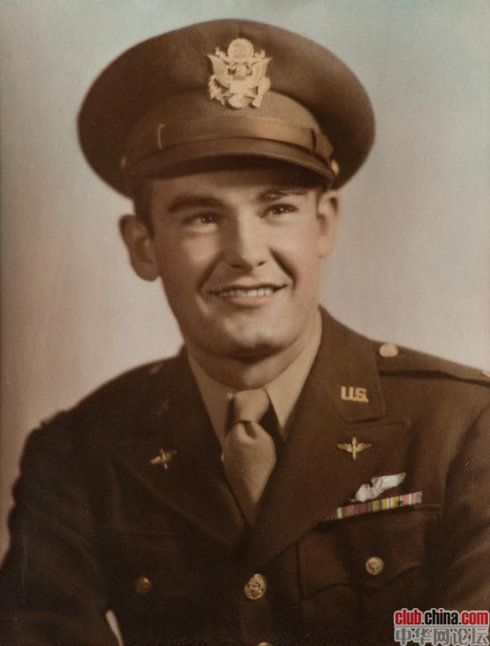The reunion of one big American and Chinese family
- By Wu Jin
 0 Comment(s)
0 Comment(s) Print
Print E-mail China.org.cn, September 15, 2014
E-mail China.org.cn, September 15, 2014
The rescue of American pilot Glen Beneda by Chinese villagers during World War II resulted in a close bond between them and the Beneda family, a bond which Beneda's elder son says makes them one big family.
 |
|
Glen Beneda |
When Glen Beneda parachuted out of his plane, shot down by a Japanese aircraft on his 81st mission over 70 years ago, he could hardly have imagined that his life would become closely bound with those of a number of Chinese families in rural Hunan Province.
When he landed in a field in Jianli County, one kilometer away from the Xiafeng Lake, where his plane crashed, several Chinese villagers spotted him and carried him to the home of one of the villagers. Beneda could speak little Chinese, and the villagers did not know any English, so communication was hard in the beginning. But when the villagers heard him say "Meiguoren" (American person), they grasped that he was an American pilot from the legendary Flying Tigers, who came to China to assist the country in its fight against the Japanese invaders. The villagers sympathized with and cared for the injured pilot, and Beneda was soon transferred to a military base of the New Fourth Army, a military division led by the Communist Party of China (CPC) during wartime, to receive medical treatment.
"My father injured his leg on his 81st mission when he parachuted out of his plane. The Chinese carried him on a stretcher and later he rode on a donkey over a 60 day period until he was reunited with his unit," recalled Edward Beneda, the elder son of the late veteran.
Beneda enlisted in the U.S. Air Force when he had just turned 18, one month after the Japanese bombarded Pearl Harbor, a military base in the United States, on Dec. 7, 1941. After completing his training and commission, he received orders to join the 14th Air Force, which was reorganized from the disbanded American Volunteer Group commanded by Claire Lee Chennault in China.
Over 70 years have passed. The rumbling bombers and fighters have disappeared from skylines which have changed greatly since the war. Peace has been restored in many parts of the world and Glen, the wartime pilot, was able to return to the United States, get married, work and raise a family. It was unclear whether the ferocious war scarred his life, because according to his elder son, Beneda was too proud to show any traces of trauma left by war in front of his family, although his injured leg would sometimes slightly betray his will. But the whole family was shocked to see the old man's long-concealed emotion pour out one day in 2005 when a friend told the veteran that the villagers from Jianli County were searching for him. Tears started to well up in his eyes. Despite the nine stents in his heart, Beneda resolved to fly thousands of miles to reunite with his rescuers. This reunion began a process of ongoing contact between Beneda's family and the families in Jianli County.
"Dad always said that he owed the Chinese people a debt that he could never repay; not a financial debt, but a debt of gratitude, thanksgiving and love," said Edward Beneda.
Glen died in 2010, and his family sent part of his ashes to China to commemorate his unforgettable experience on the opposite shores of the Pacific Ocean, where a deep, profound friendship endured the atrocity of war and decades of separation. This bond continues to influence the families from both countries, despite language barriers and cultural differences.
"The people of Hunan are family – we love them, and love transcends cultural and language differences. Do we need to work together in this regard? Yes, but the adventure will be a shared with joyful expectation on both sides," Edward Beneda said.






Go to Forum >>0 Comment(s)